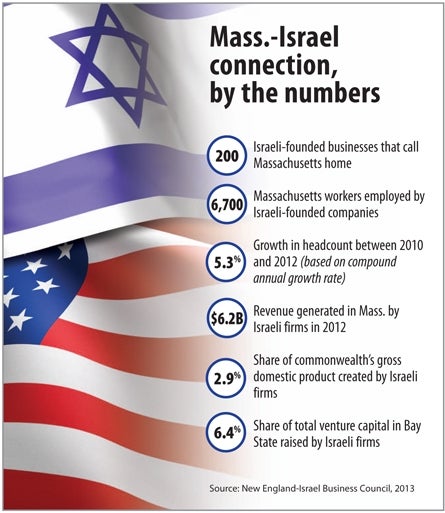As Israeli biotechs mature, Mass. comes calling

Israel was a great launching pad for Argo Medical Technologies.
Operational costs were low, bureaucracy and regulation were limited, and venture capitalists were willing to fork over money early in the development process.
“It's a more open, more risk-taking market,” CEO Larry Jasinksi said.
As work on the ReWalk — which allows a paralyzed person to walk again — neared completion, Jasinski knew the company needed to tap into markets larger than Israel, which only has eight million people, less than 3 percent of the United States' population.
With 60 percent of projected device sales and the highest healthcare reimbursement rates in the world, the U.S. quickly emerged as an obvious choice. But where in America should Argo expand?
Jasinski grew up in the Southeastern U.S. and knew the area offered cheap labor and a pleasant climate. Ultimately though, the quality of the medical institutions and workforce brought Jasinski to Massachusetts.
Argo's Marlborough location — which opened in January 2013 — has provided the company with access to financial talent with extensive experience working in Europe and Asia for companies such as Boston Scientific. Plus, the strength of Greater Boston's medical centers means it will be easy to test the ReWalk on area veterans and residents.
The company, which employs 13 in Marlborough, received approval in late June from the U.S. Food and Drug Administration to market its ReWalk Personal System to individuals with spinal cord injuries.
Argo is one of more than 200 Israeli-founded businesses to call the Bay State home, according to a 2013 study by the New England-Israel Business Council (NEIBC). Israeli entrepreneurs choose Massachusetts over other states 44 percent of the time, the best such figure in the country, according to a 2012 Kaufmann Foundation study.
Home to 11 percent of American drug development and more than a fifth of all U.S. biotech venture capital, Massachusetts has particularly piqued the interests of Israelis with life sciences backgrounds. Like Argo, Israeli-based Itamar Medical has its U.S. headquarters in MetroWest.
Itamar, which makes devices that detect sleep and cardiovascular issues, was one of the earlier Israeli biotech companies to come into Massachusetts when it opened a Framingham office in 2000. Recruiting Israeli firms wasn't a public-sector priority at that time, said Arnon Tuval, its vice president of operations, so there were only a few offers of assistance or support.
But Itamar persisted, and today derives nearly half of its revenue from the U.S., Tuval said. Lower rents lured the company to Franklin in 2012, and today its 11 Massachusetts employees do everything from inventory to customer service to lab work.
'Fertile territory'
Israelis also make up 5.3 percent of immigrant founders of Massachusetts biotech companies, more than all but six other countries, according to a 2007 study prepared for the Immigrant Learning Center. Those companies include Karyopharm Therapeutics and SBH Sciences, both of Natick. (Karyopharm will soon move to Newton.)
“Massachusetts is the undisputed global leader in the field, and that makes a big difference,” said Angus McQuilken, spokesman for the Massachusetts Life Sciences Center. “Israel tends to be a fertile territory for us.”
Israel has earned its “start-up nation” moniker thanks to an influx of Russian scientists with doctorate degrees who emigrated there following the downfall of the Soviet Union in 1991, according to Jerry Schaufeld, a professor at Worcester Polytechnic Institute's school of business and a member of NEIBC's advisory board.
That spurred the creation of eight incubators in the tiny country, four of which Schaufeld said are focused exclusively on life sciences.
“Israel is a country from the very beginning that had no natural resources except for its people, its brains,” said Steve Schuster, CEO of Westborough-based Rainier Communications, which has had offices in Israel since 2007.
But weak domestic marketing and distribution channels and a lack of serial entrepreneurs usually forces Israeli biotechs to expand abroad, Schaufeld said.
“They need New England's resources in order to succeed,” he said.
That expansion also entails adapting to a new business culture.
Israelis tend to be very direct and straightforward in business conversations and less likely than Americans to engage in sugarcoating or pleasantries, Schuster said. This sometimes comes across to American businesspeople as overly aggressive or rude, though Schuster emphasized it helps prevent misunderstandings.
In addition, Israeli workplaces tend to be very casual, with suits and ties much less common there than in the United States, said Itamar's Tuval.
Governors as pitch men
A few years ago, when Argo was looking for an American home, recruitment efforts had greatly evolved.
Jasinski spoke with Gov. Deval Patrick during his 2011 trade mission in Israel, met with members of his office on three separate occasions, and received a visit from Patrick after Argo moved to Marlborough. Sixteen governors — including Patrick — led trade delegations to Israel between 2010 and 2013, according to the NEIBC.
Raphael Nir came to America from Israel in 1991 and co-founded SBH Sciences six years later. Today, it employs 15.
SBH has collaborated with several Israeli firms over the years, including in 2012, when it received $202,000 from the Massachusetts-Israel Innovation Partnership to work with a Tel Aviv-area company and build prognostic kits for specific immune system functions.
Modern technology has made doing business abroad a cinch, Nir said, with money-wiring services making it easy to pay for foreign products and videoconferencing bridging immense geographic gaps.
But there's still one thing New England and Israel lack: a direct air connection.
Both Nir and Jasinski said a non-stop flight from Boston to Tel Aviv would save executives time and hassle when they travel for business. However, with plenty of European connections, Nir said the inconvenience is relatively minimal.









0 Comments